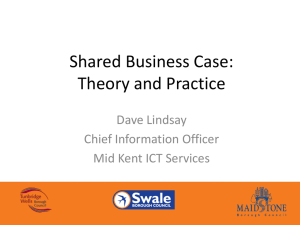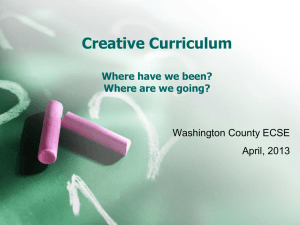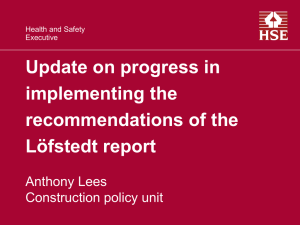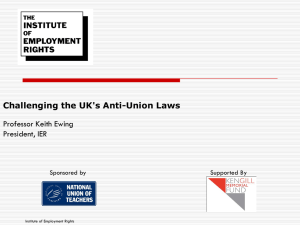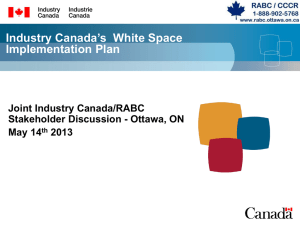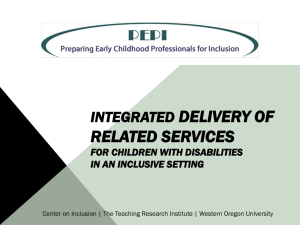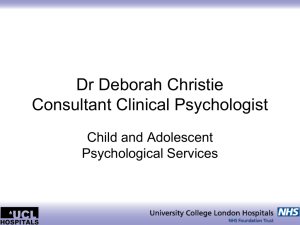Module 3 Main - University of Toledo
advertisement
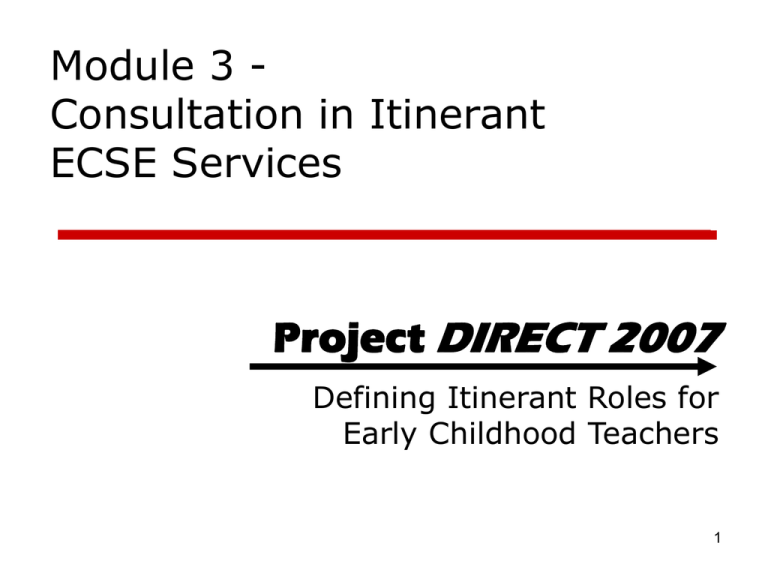
Module 3 Consultation in Itinerant ECSE Services Project DIRECT 2007 Defining Itinerant Roles for Early Childhood Teachers 1 Objectives Describe Process of Consultation Describe Critical Elements of Consultation 2 Components of Effective IECSE Consultation Service Model Monitoring of Child Progress Analysis of Learning Environment Feedback/Partner Progress Prioritizing Child IEP Objectives Transfer of Knowledge, Skills, Attitudes & Values Administrative Support Interpersonal Communication Skills Communication with Families Self-Advocacy & Professional Development 3 Definition of Consultation Consultation is a process based upon an equal relationship characterized by mutual trust and open communication, joint approaches to problem identification, the pooling of personal resources to identify and select strategies that will have some probability of solving the problem that has been identified, and shared responsibility in the implementation and evaluation of the program or strategy that has been initiated. Brown, Wyne, Blackburn and Powell (1979) 4 Types of Consultation Expert Consultation Within an expert model, the Itinerant ECSE teacher helps the partner learn new information, make a decision, or solve a problem. Consultants who assume an expert role seek to determine what their partner needs to know to advance development of child. Collaborative Consultation A more common approach to providing consultation services in ECSE is a collaborative approach. Collaborative consultation implies that both the consultant and the partner bring to the relationship valuable knowledge, experiences and skills. 5 Roles of Consultant Observer/‘ Reflector’ • raises issues for partner reflection. ‘What if………’ Fact Finder • gathers child ‘data’ and intervention support Problem Solving Partner • offers alternatives and participates in decisions Trainer/Educator • ‘teaches’ partner specific SPED strategies Expert • recommends partner practice options or strategies Advocate (child and partner) • ‘lobbies’ for supports for child and partner Adapted from Lippett & Lippett (1986) 6 Key Factors in the Consultation Model It is essential that both consultants and consultees (or partner) agree on the intended outcome of the consultation process The overall goal of consultation is to implement the child’s IEP through enhancement of the skills of the consultee (or partner) 7 8 Essential Elements of Consultation “Through a series of meetings and conversations, the consultant helps the consultee (or partner) with systematic problem solving, social influence, and professional support” • Consultation is a planned process that takes place over time and includes problem-solving, social influence and professional support 9 Essential Elements cont’d… “In turn, the consultee (or partner) helps the child with support and assistance of the consultant.” It is the partner’s responsibility to work with the child with appropriate support from the Itinerant ECSE consultant Information on the Role of a Consultant Building Collaboration from partner perspective 10 The Process of Consultation Buysse and Wesley (2005, p. 18) describe an 8-Stage process within CONSULTATION: Stage 1: Stage 2: Stage 3: Gaining Entry Building the Relationship Gathering Information Through Assessment 11 The Process of Consultation cont’d… Stage Stage Stage Stage Stage 4: 5: 6: 7: 8: Setting Goals Selecting Strategies Implementing the Plan Evaluating the Plan Holding a Summary Conference 12 Strategic Objectives Stages of Consultation Stage 1 - Gaining Entry • Factors that Itinerant ECSE may need to address to decrease partner apprehension re: objective of partnership and potential for unequal partnership Affect of possible unequal levels of formal education on partnership Perception of inferiority re: SPED skills Intrusion of another professional into environment Trustworthiness of Itinerant ECSE Concern that child outcomes may become their sole responsibility 13 Stage 1 cont’d… • Itinerant ECSE Professional must acknowledge and address their own… Anxiety Personal values Professional values Expertise in ECSE Expectation for success in Itinerant ECSE consultation role 14 Stage 2 – Building the Relationship • Shape the Basis for Consultation Relationship Develop awareness of personal and professional perspective of partner. What is ‘in it’ for her in this partnership? What is ‘in it’ for Itinerant ECSE teacher? Establish priorities of partner for development of target child and other children (e.g. classroom, childcare or home) Understand that an effective partnership is developed through trust, support and mutual respect and meeting expectations of partner for support Resist the ‘Quick Fix’ role - Consultant as discrete ‘problem solver’ 15 PROGRESSION OF CONSULTATION PARTNERSHIP 100 90 80 70 60 50 40 30 20 10 0 Partnership Series4 Comfort Series3 Rapport Series2 Building 1 2 3 Stages 4 Introduction Series1 16 Determining Partner Concerns and Goals for Child: Sample Interview ?s What do you hope _______ will learn to do next? What is important for me to know about ______ ? How does _________ compare to his peers in the various areas of development? In what ways is _________ different from the other children in the classroom? What do you think _______’s parent(s) expect for him? Skills he will learn? Next educational environment? 17 Stage 3 - Gathering Information • Itinerant ECSE Professional must acknowledge and address their… Anxiety Personal values Professional values Expectation for success in Itinerant ECSE role 18 Stage 3 - Gathering Information cont’d… Establish experience of partner with consultation: • ‘Have you ever worked with a consulting teacher, speech therapist, etc.?’ • ‘What were some of the positive outcomes for you? • ‘What were some of the positive outcomes for your child? • ‘What do you feel are the most important aspects of early childhood development?’ • ‘What are your thoughts about inclusion of young children with special needs in preschool?’ 19 Stage 3 - Gathering Information cont’d… Establish knowledge base of partner re: early childhood education/SPED • ‘How have you come to learn about early childhood development?’ Establish related ‘professional’ experience of partner re: early childhood education/ECSE • • ‘How many years have you been involved in ECE?’ ‘What are some of the experiences you have had in ECE programs?’ 20 Stage 4 - Setting Goals • Itinerant ECSE teacher and partner agree on: A) Priority learning objectives for child • • MEPI Analysis (Module 4) Demands of ‘Next’ or home environment B) Priority professional / personal (parent) development objectives • • Additional skills Additional information 21 Stage 5 - Selecting Strategies • Itinerant ECSE teacher and partner agree on methods that will be adopted to address: A) Priority learning objectives for child • • • Embedded Instruction (Module 4) Incidental Teaching Strategies (Module 4) Direct instruction (e,g, applied behavior analysis, hierarchy of prompting/ system of least prompts, time delay) B) Priority professional / personal (parent) development objectives • • Print, video or web-based information materials Demonstration of techniques by Itinerant ECSE 22 Stage 6 - Implementing the Plan • Itinerant ECSE teacher and partner agree to address priority learning objectives of child (see Stage 4) via: Analysis of learning opportunities in daily routines (school or home) Development of Intervention Planning Matrix linking priority learning objectives with opportunities 23 Stage 6 - Implementing the Plan cont’d… • Itinerant ECSE teacher and partner agree to implement systematic instruction via: 1. Embedded learning 2. Incidental instruction 3. Direct instruction (e,g, applied behavior analysis, hierarchy of prompting/ system of least prompts, time delay) 24 Stage 6 - Implementing the Plan cont’d… • Itinerant ECSE teacher and partner agree to address professional development objectives (established in Stage 4) of partner: Partner accesses resources to improve knowledge Partner accesses resources and/or practices newly acquired or refined skills 25 Stage 7 - Evaluating the Plan • Itinerant ECSE teacher and partner agree to evaluate plan for implementation of child-focused intervention via: Periodic observation of systematic instruction (IECSE as observer). There is evidence that priority IEP objectives are addressed on a daily basis by partner Improvement in priority IEP-focused skills or behaviors of child are observed by IECSE 26 Stage 7 - Evaluating the Plan cont’d… • Itinerant ECSE teacher and partner agree to evaluate plan for professional development objectives (established in Stage 4) of partner: Partner describes effect of acquired information on understanding of disability condition (s), planning skills and/or teaching skills Partner demonstrates acquisition of skills or refinement of skills during observation of Itinerant ECSE teacher 27 Stage 8 - Summary Conference • Itinerant ECSE teacher and partner review and evaluate: Effectiveness of intervention plan in meeting IEP-focus outcomes for child Effectiveness of coaching in supporting partner to access relevant developmental or disability related information Effectiveness of coaching in supporting partner in addressing priority IEP objectives in daily routines and activities (home or classroom) 28 Stage 8 - Summary Conference cont’d… • Itinerant ECSE teacher and partner review and evaluate: Effectiveness of coaching in supporting partner in acquiring targeted intervention / teaching skills Effectiveness of coaching in supporting partner in refining targeted intervention / teaching skills 29 Definition of Process and Objective of Consultation n Consultation is an interactive process with specific stages. The skillful consultant recognizes this cycle and considers how and when to move the consultation through the stages of entry, issue definition, implementing recommendations, and conclusion. While team members are always considered partners in the consultative process, the consultant must take the initiative to “facilitate and examine the process, and change its course if the process does not seem to be working” (Bundy, 1991, p. 325). This is accomplished by selecting a variety of intervention strategies, consulting methods, and interaction styles.. (Modified from Hanft & Place, 1996, p. 105) 30 Critical Components of Consultation The following are 3 interrelated components of consultation (Buysse & Wesley, 2005) A. Problem-Solving B. Professional Support C. Social Influence 31 Component A: Problem-Solving A problem-solving approach reflects the following steps: 1. Identify the problem/issue/ concern 2. Generate possible solutions to the problem 3. Choose the most appropriate solution 32 Problem-Solving cont’d… 4. Implement the solution 5. Evaluate the effectiveness of the solution 6. Cycle through process again if solution didn’t work 33 A Hierarchical Planning Model for Consultation Step 1- What does student need to learn Review IEP objectives Step 2 - What environmental modifications will facilitate acquisition of skills/behaviors? Conduct observation of learning environment Complete Activity x IEP Objective Matrix Step 3 - Which learning strategies will facilitate acquisition of these skills/behaviors? Identify appropriate indirect/incidental and direct instruction options 34 A Hierarchical Planning Model for Consultation cont’d… Step 4 - Which consultation strategies will be effective in transferring knowledge to partner? Identify ‘partner-friendly’ consultation strategies / interpersonal communication Step 5 - Which consultation strategies will be effective in transferring skills to partner? Identify ‘partner-friendly’ consultation strategies / interpersonal communication Step 6 - How will efficacy of consultation be determined? Strategies to monitor child progress Strategies to monitor partner relationship 35 Component B: Providing Professional Support An important responsibility of an Itinerant ECSE consultant is to provide professional support to those around them Professional support refers to the words and actions of a consultant that helps consultees reach mutually-agreed upon outcomes 36 Providing Professional Support cont’d… Professional support helps consultees feel Comfortable, Confident and Competent (CCC) in their abilities to achieve important outcomes 37 Consultee Characteristics that Promote CCC The consultee believes that she or he has the knowledge, skills, and motivation necessary to get the job done OR The consultee believes that she or he has the capacity to gain the knowledge, skills or motivation necessary to get the job done 38 Consultant Characteristics that Promote CCC cont’d… The consultant believes that the consultee can get the job done. The consultant can provide the help or support the consultee needs to get the job done. OR The consultant knows where to find help or support that the consultee needs. 39 Consultation Objectives and Outcomes Assist partner in acquiring a new skill • Use of systematic prompting • Use of PECS system • Use of microswitch to activate spin art • Relocate literacy area to decrease auditory distraction • Explain implications of ADHD re: child compliance • Children required to ‘plan’ prior to choice of activity Introduce new resource Adapt materials Modify environment Reframe perspective of partner Modify routines or schedules Adapted for Hanft and Place (1996) 40 Factors that Affect the Effectiveness of the Consultation Process Time Demands (e.g. caseload, travel, planning time) • • • Create released time (volunteer relief, university students, subs) Schedule meetings Establish consultation logs / information exchange (e.g. listserv) Administrative Support • • Letters of Introduction ‘Contract’ Partner’s Expectations • Ask… Partner’s Attitudes • Identify and determine basis (e.g Self-Assessment . . .) 41 Factors that Affect the Effectiveness of the Consultation Process cont’d… Consultation Skills • Expect to learn from partner • Use appropriate styles and strategies that are ‘partnerspecific’ Professional Expertise/Professional Experience • Provide ‘preferred’ and current practice information • Avoid jargon • Conduct inservice sessions for all staff Adapted from Hanft and Place (1996) 42 A Consultant’s Words and Actions are Important Demonstrating Respect for Consultee: • • • • • Time (e.g., arriving and leaving on time) Responsibilities (e.g., not expecting Consultees to drop other responsibilities) Respect (e.g., not “talking down” to Consultees, using active listening strategies) Completing or addressing tasks that have been promised (‘follow-up’ on promises) Here is more information on Active Listening Skills 43 A Consultant’s Words and Actions are Important cont’d… Body language that demonstrates interest and respect to the consultee: • • • Maintaining eye contact Keeping extraneous movements to a minimum Adopting a posture that reflects interest 44 Providing Support to the Consultee Friendship vs. Collegial Support • • The relationship between a consultant and consultee is professional and not personal The nature of this relationship is guided by the need to benefit the child and/or family, so interactions between the consultant and consultee should reflect a professional nature (Stages of Relationship Development) 45 Top 10 List…Indicators of Partner Satisfaction with Consultation -Characteristics of Effective Consultants 10. Good Communicator 9. Understands the System 8. Trustworthy 7. Confident 6. Effective in Establishing Rapport 46 Top 10 List…Indicators of Partner Satisfaction with Consultation - Characteristics of Consultants - 5. Approachable 4. Knowledgeable 3. Demonstrates Respect for ECE Partner 2. Maintains Confidentiality 1. Practices in Ethical Manner nKnoff, McKenna and Riser (1991) 47 Peer Coaching in Consultation “Peer coaching is a confidential process through which two or more professionals work together to reflect on what they are currently doing, refine current skills and build new ones, share new ideas with one another, or solve problems...” (Gallacher, 1995, p. 10) Expert Coaching: Coaching is conducted by a specially trained teacher with expertise who observes, gives support and feedback, and makes suggestions to less skilled or untrained peers or parents. 48 Coaching and Consultation How is coaching the same as consultation? Coaching is another way of helping general education teachers learn how to support the inclusion of children with special needs. Both consultation and coaching involve one adult helping another. Both consultation and coaching require that adults spend time together on a regular basis to build relationships so that learning can take place. 49 Coaching and Consultation (cont.) How is coaching different from consultation? Coaching and consultation differ, however, on the goal of the relationship . . . Within a consultative relationship, the major goal is to help one person gain new knowledge or information. A coaching relationship exists primarily to help one adult learn a new skill or learn how to use information. 50 Interpersonal Communication Skills Personal/Professional Relationships A Dynamic Model Listening Skills • Effective/Ineffective Listeners 51 Interpersonal Communication Skills / Knowledge Base: A DYNAMIC MODEL High Interpersonal/ High Interpersonal/ High Professional Low Professional Low Interpersonal/ High Professional Low Interpersonal/ Low Professional 52 Partner Dispositions: Interpersonal and Professional Interactions • High • High Communicative Communicative • High Communicative Manner • High Personal Efficacy • High Commitment Manner • High Personal Efficacy • Low Commitment Manner • Low Personal Efficacy • High Commitment • Low Communicative Manner • High Personal Efficacy • Low Commitment • Low Communicative Manner • Low Personal Efficacy • High Commitment • Low Communicative Manner • Low Personal Efficacy • Low Commitment • Low Communicative Manner • High Personal Efficacy • High Commitment 53 Listener Characteristics Effective Listeners Not So Effective Listeners • Create comfortable • Allow themselves to be atmosphere distracted • Evidence interest in partner • Steer the conversation • Provide partner with undivided attention • Provide eye contact and positive body language • Encourage partner to talk • Let partner steer or direct conversation • Are judgmental • Interrupt • Offer advice • Use humor inappropriately 54 Strategies that Avoid Interpersonal Conflict Think Before Speaking • • • Don’t jump to conclusions (reflect and consider all factors) Assume partner is doing their best Model ‘Openness’ Demonstrate Respect Provide Sincere Compliments • Acknowledge partner’s contributions and development Transform ‘Strained’ Relationships • • Assume responsibility for communication ‘mistakes’ Acknowledge tensions, however refocus on child Adapted from Hanft and Place (1996) 55 C. Social Influence The consultant (Itinerant ECSE teacher) is in a position to affect the behavior and teaching skills of her partner as a result of: • Perceived competence • Experience in intervention • Advanced education or specific education in Special Education 56 Social Influence cont’d… The outcome of survey research (Dinnebeil, Hale & McInerney, in press) indicates that ECE partner teachers welcome interaction with Itinerant ECSE teachers and other professionals who are perceived, positively, as ‘experts’ The inherent value of the Itinerant ECSE/ECE partnership, from the perspective of the ECE teacher, is the competence of the Itinerant ECSE teacher 57 Social Influence cont’d… Partners anticipate assistance from a professional who has knowledge and skills related to the development of young children with developmental delays Partners anticipate assistance from a professional who has knowledge and skills related to effective intervention with young children with developmental delays 58 Social Influence cont’d… To the extent that the Itinerant ECSE lacks expertise, confidence or avoids the role of ‘expert’, they are not meeting the expectations of their partner 59 Social Influence cont’d… Expertise and authority are expected by the partner. It is the ‘manner’ in which this expertise is shared that will determine the outcome of the consultation. The ‘manner’ is related, directly, to appropriate evaluation of the resources, motivation and expectations of the partner AND adoption of a range of interpersonal communication skills that are a match to the preferred communication mode and style of the partner 60 For Discussion…Evan Is Too Aggressive Jill is an itinerant ECSE teacher working with Mary Jo, an early childhood teacher who is Evan’s teacher. Evan is 5 years old and has autism. Evan has been on Jill’s caseload for 4 months and in Mary Jo’s classroom for a month. 61 Evan Is Too Aggressive cont… Mary Jo is concerned because Evan has limited verbal skills which creates ‘problems’ (e.g. screaming, scratching, pushing) in his interaction with his peers Jill and Mary Jo are meeting to discuss Evan’s progress and the topic of Evan’s ‘negative behavior’ is at the top of the agenda! 62 Evan Is Too Aggressive cont… What should Jill say and do during this visit with Mary Jo to help Evan to be successful in this early childhood environment? 63 Evan Is Too Aggressive cont… Prepare to discuss recommendations with the rest of the group, including specifics related to: • • • Information that might help Mary Jo Skills that Mary Jo may need to learn Expectations for IEP-focused interventions to be managed by Mary Jo 64 Evan Is Too Aggressive cont… Role play the situation with a partner and be prepared to discuss the things that Jill should say and do to provide Mary Jo with the professional support that she needs (and expects). • Michelle and Eleanor Approaches to Consultation--a Case Study • Advanced ECE Partner Teacher Case Studies 65 Evan Is Too Aggressive cont’d… How would your recommendations be affected by this information re: Mary Joe and Jill (Itinerant ECSE Teacher) Scenario #1 • • Mary Jo is 40-year old ECE teacher who holds BS Degree in ECE and has 10 years of experience Jill is 24-year old with BS in ECE and 2 years experience as Itinerant ECSE 66 Evan Is Too Aggressive cont’d… How would your recommendations be affected by this information re: Mary Joe and Jill (Itinerant ECSE Teacher) Scenario #2 • • Mary Jo is 30-year old with AA Degree in Child Care Technology and has 2 years of experience in PreK. Jill is 26-year old with BS in ECE, M.Ed.in ECSE and 3 years experience as Itinerant ECSE 67 Evan Is Too Aggressive cont’d… How would your recommendations be affected by this information re: Mary Joe and Jill (Itinerant ECSE Teacher) Scenario #3 • • Mary Jo is 29-year old with H.S. Degree and has 7 years of experience in PreK Jill is 40-year old with BS in ELEM ED, 4 years experience as Grade 4-5 teacher and 2 years experience as Itinerant ECSE 68 Evan Is Too Aggressive cont… How would your recommendations be affected by this information re: Mary Joe and Jill (Itinerant ECSE Teacher) Scenario #4 • • Mary Jo is 45-year old with High School degree and CDA and has 16 years of experience in Head Start Jill is 35-year old with BS in SPED, 4 years experience as Middle School SPED teacher, and this is her 1st year as Itinerant ECSE teacher 69 Evan Is Too Aggressive cont’d… How would your recommendations be affected by this information re: Mary Joe and Jill (Itinerant ECSE Teacher) Scenario #5 • • Mary Jo is 35-year old with High School degree 12 years of experience in PreK. Jill is 52-year old with Master’s degree in ECSE,10 years of experience in classroom-based ECSE and 9 years of experience year as Itinerant ECSE teacher 70 Outcomes of Consultation Improved comfort level of partner • Partner may feel less isolated and in greater control of situation after working with consultant 71 Outcomes of Consultation cont’d… Increase skills or knowledge of partner • Partner understands function of child’s challenging behavior and changes the way she interacts with the child 72 Outcomes of Consultation cont’d… Changes in child’s environment • The child’s classroom or home is rearranged to promote active exploration and interaction • Materials and expectations may be modified in accord with children’s skills 73 Outcomes of Consultation cont’d… Improvements in service delivery systems • The child’s Speech Pathology schedule is modified so the child can be observed by the SLP in an informal, play-based activity to determine response to peer communication attempts 74 Transfer of Knowledge, Skills, Attitudes & Values Benefits and Drawbacks of Inclusion (adapted from Bailey & Winton, 1987) Self-Assessment for Child Care Professionals (Wesley & Buysse, 1994) Activity Schedule by Developmental Domains Activity Schedule by IEP Objectives Inclusive ECSE Curriculum Top-Down Curriculum Model (Pancakes) Incidental Teaching (SPIES) Principle of Partial Participation Hierarchy of Prompts Intervention Strategies Matrix 75 Transfer of Knowledge, Skills, Attitudes & Values Notebook proactive responsive Professional Literature/Resources Young Exceptional Children (Journal) Videos commercial ‘homemade’ SERRC Local Listserv Personal Website www.dec-sped.org/journals.html#yec Child Care Plus +, Univ. of Montana www.ccplus.org/ Child Development Resources www.cdr.org/ National Dissemination Center for Children w/ Disabilities www.nichcy.org Circle of Inclusion Website www.circleofinclusion.org Project SPIES for Parents www.spiesforparents.cpd.usu.edu/Site %20Map.htm 76 Benefits of Consultation Effective Use of Available Personnel Supports IDEA Mandate for Inclusion in LRE and Natural Environments Builds Skills of Partners Enhances problem Solving Resources Adapted from Hanft and Place (1996) 77 Summary The role of a consultant is complex, challenging and very rewarding Thinking about the information presented here, identify your knowledge, skills, attitudes and dispositions that are related to serving as an effective Itinerant ECSE professional 78 Summary cont’d… What strengths do you already possess in the areas of knowledge, skills, attitudes and dispositions that are related to serving as an effective Itinerant ECSE professional? What are things that you need to improve? 79 Summary cont’d… What would be your plan for professional development? 80

